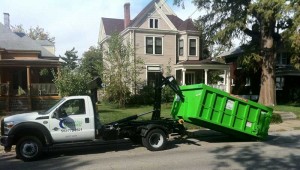7 Helpful Tips for Cleaning Up Yard Waste and Debris

Moon Dumpsters delivers your dumpster rental to your location and picks it up and disposes of the contents whenever you are finished with your project. Call for more info about our services in Kentucky and Southern, Indiana.
Yard waste and debris can ruin the exterior appearance of your home. It can build up over time and can be challenging to clean up after a while. Regular yard cleaning is an excellent way to maintain your home’s outdoor areas. And if you get organized, you don’t need to sacrifice the entire weekend on this task. Follow along for some helpful cleaning tips that may help you complete this chore efficiently and effectively:
- Remove Large Debris First – Remove debris like plastic pans, boxes, paper, bags, toys, etc., first. You can collect all of these items in a bin for more straightforward disposal. Be on the lookout for dangerous objects like sharp tools, nails, pieces of glass, etc. It is especially important to do this after winter because snow cover can hide dangerous debris easily. Remove all tree branches, pinecones, large debris, and big pieces of wood as well. Addressing large waste first ensures you don’t miss smaller items later.
- Clean Up Pet Litter – Pet litter is a common sight in backyards, especially after the winter snow melts away. It is a good idea to remove all pet waste and discard of it safely. Don’t use it in compost or add it to the soil. There are safer and more effective ways to restore soil nutrition. Most pet owners have tools to scoop up litter and easily transport it to a garbage bin. They’re easily available at local pet stores or online as well.
- Use Biological Matter for Compost – Use small twigs, fallen leaves, flowers, and fruits for composting. You can also include waste from your kitchen in a compost pile. Use a small rake to remove everything from fallen foliage to dead grass before adding them to your compost pile. People who don’t have a compost but are interested in making one can know how to make one can find detailed information online about composting. This process is very beneficial, especially for people who like to maintain smart herb gardens or planters.
- Pack Away All Garden Tools – Remove all landscaping and gardening tools from your yard and lock them away safely. Many homeowners forget to store their gardening tools properly after tending to their plants, which can lead to injuries. You need to be especially careful if you have children or pets.
- Recycle Everything You Can – Recycle debris wherever possible. Everything from stray plastic bags to leaves and twigs is recyclable. A good recycling center will collect all of these materials and dispose of them according to mandated guidelines. Don’t throw these items in your regular trash bin as many trash collection companies don’t have sound recycling systems in place. Some companies won’t even pick up trash with landscape or backyard debris.
- Turn Twigs, Leaves, and Plants into Mulch – You can turn twigs, branches, and dead plants into mulch. A wood shredder can turn this debris into mulch for landscaping and gardening. Mulch adds a layer of protection around a plant’s roots, helps the soil retain moisture, and protects the delicate roots from the weather conditions, which contributes towards overall tree health. Wood chip mulch is good for planters, herb gardens, trees, and bushes but isn’t suitable for grass. Make sure you use the right kind of mulch during landscaping.
- Use a Professional Dumpster Service to Make Yard Clean Up Easier – If you have a large yard or a yard with a lot of debris, you might benefit from renting a dumpster to make your clean up experience easier. Moon Dumpsters, for example, offers units for rent in many different dumpsters sizes ranging from 6 cubic yards to 40 cubic yards. Delivered straight to your door, and picked up and disposed of whenever you are ready, a dumpster rental can take a lot of the hassle out of yard cleaning.
All of these tips detailed above will help you maintain your yard easily, without wasting too much time on the process. Landscaping experts recommend a thorough cleaning during early spring as it can help grass and plants grow without problems.





